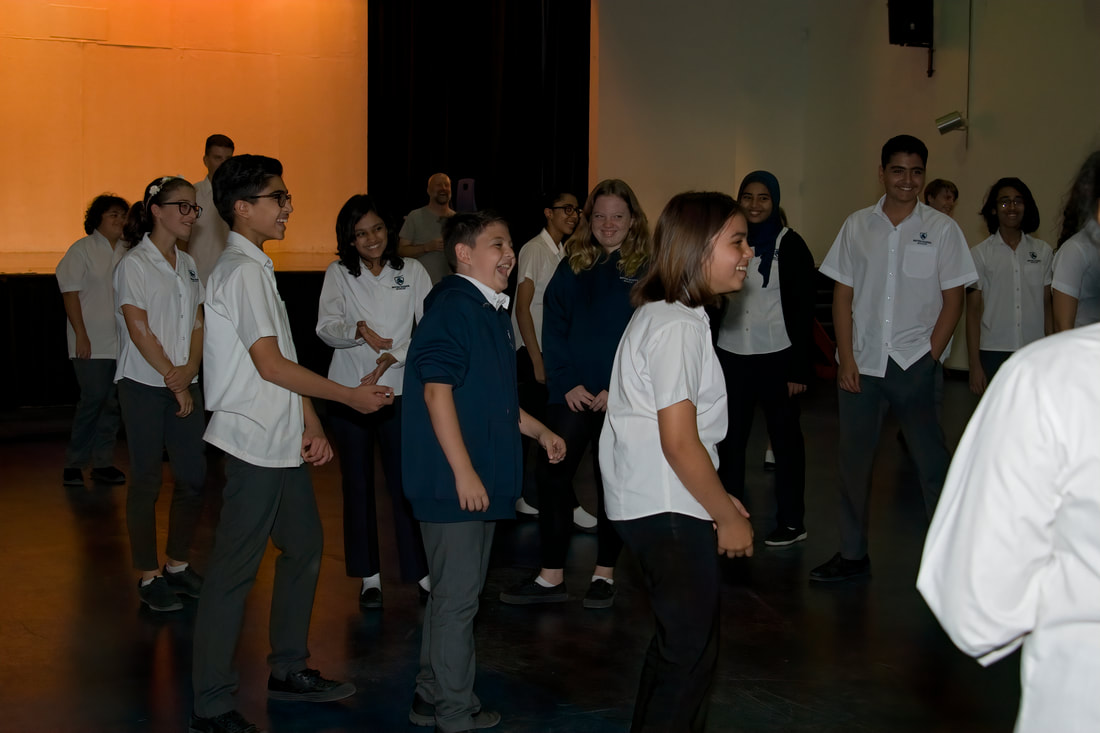|
It’s back in July, and you were waiting for your timetable so you could plan ahead (while sitting on the beach, sky-diving or paint-balling – or whatever your form of relaxation is!) But then it arrives. And all your fears are realised - you have to teach drama! Are you starting to teach drama this September - but it’s not your subject? Are you the head of a Drama department wanting to support a new non-specialist into your team and worried about how you are going to be able to meet with them when they have their own subject meetings to attend? Written for the non-specialist, this series of articles aims to demystify what goes on in the drama room, through practical advice, tips and strategies. They are designed not only to ensure that the students have effective drama teaching and learning, but also to make sure that the non-specialist feels supported! Today's topic is behaviour management in drama, but over the coming weeks I will also be posting on the following topics:
Behaviour ManagementBehaviour Management in drama is probably the key area most non-specialists are worried about. Rather than the world you know, with desks, chairs and books, you are suddenly having to control the movement of 30 children in a large (if the drama department is lucky) empty space. 4 top tips Remember - the children are used to being in this space and the department will have already set up some protocols for behaviour. You need to find out what they are – and stick to them. It may be that in your own classroom, over the years you have decided to go a little ‘off-piste’ and relax some of the school’s expectations. Table plans, lining up outside, books on the table before you start… (Really? Ignore those rules? Never!) However, when you are working in a practical space for the first time, there are certain recommendations that really are there for a reason. And the minute you choose not to follow them, that is the minute a student might decide to take advantage. The following are written through my experience of seeing non-specialists in a variety of schools struggle with little structured support. Dip into those that make most sense to you - obviously if you already have established relationships with the students you'll be teaching, then you may not need to follow these so strictly. 1. Arrival and start of the lesson Some of the rules for the start of the lesson are likely to include the following, although the Head of Drama will tell you those pertaining to your school:
2. Leaving the space It seems right to talk about the end of the lesson here too, otherwise – just like a classroom – there is a danger that the bell will go, they have to get to their next class, and you are left with 30 chairs to put away! Whilst collecting bits of script / paper resources / costumes etc. For the first few lessons it is wise to keep an eye on the clock. PE, Music, Art and Science teachers and others involved with practical activities, will know that tidying up often takes far longer than anticipated! It is a good idea to start with, to pack up and then do the plenary / closing questions. That way, they are ready to go when you are ready to dismiss them. This also has the added benefit of reminding them that you need to finish the task before they can leave – a good behaviour management strategy! I’ll cover this again later, when talking about Managing Creativity, and the ethos of group work, but it is worth saying here that the main learning in drama comes both from the ‘doing’ and from the evaluation. This puts an importance on the plenary. Some suggested closing activities with be found in a later blog, but you should give as much importance to these on the lesson plans you have been given, as to the main part of the lesson. Don’t work up to the bell and leave no time for reflection. 3. Working in pairs and groups Lessons may follow a regular format, or may be different each time, but there are various ways of working which you will find in all drama lessons. They include:
Remember – the students are used to this. The need for you, is to be clear in your instructions. For instance – your instruction might start…
Depending on the nature of the class, I sometimes tell them to get into pairs/ groups and then give them the instruction, otherwise they won’t be listening to you while they are choosing who to work with! If this is the case, tell them that this is what you will be doing – ‘First you will get into groups and then I will give you the task.’ Consider how you are going to group them / put them in pairs:
Optimum numbers for group work are 4 or 5. Any more than that and they are more likely to lose focus. Be strong here as they will often try to convince you it will be OK. Unless you know that they are mature enough to manage a group of 6, and that this won't negatively impact on their learning, help separate them 2 into smaller groups. You will need to monitor them getting into groups, as often the same students get left out, or people refuse to work with others. Sometimes it is just a case of agreeing for them to work in a smaller group than planned. Don’t start giving the instructions until they are all listening. Good practice in all classrooms, but this is never more true than in a drama space. There are more distractions, and the sound isn’t as direct as in a normal classroom so it is easier for them not to hear what to do. If they all break away in their groups to work, and 50% of them don’t know what they are doing, it is a harder job to physically get them back than you would find in a classroom. What to do if someone refuses to work with others? There is little to be gained from digging your heels in with this. Often it is the result of an argument or other emotional response, and all that will happen is you will end up with an entire sulky group, or a student storming off! The difference in a drama lesson is how many other students in the group can be affected by this refusal. Sometimes decisions need to be made that would not necessarily be the same ones you might make in a classroom situation. What happens if someone won’t join in – or no-one wants them! On occasion you can appeal to the moral sense of a wise student and take them to one side and ask if they would look after X during the particular task. Sometimes, however, this won’t work, particularly if X is someone who can make life difficult for the others. There are a range of things X can do if you are left with them not in any group. They can help you assess the others’ work; they can spot ‘good’ or ‘effective’ drama (from a list of success criteria you give them); they can write a script; write an interview with a character, design a stage set …. Your HOD will have some suggestions here based on the lesson you are delivering. Those who are not settled. You may well talk to individuals before, reminding them that you don’t want them working together – or telling them that they can start off together, but if they are not working, they will only have one chance to put it right before being split up. Stick to this. Avoid letting the 'unsettled' work with the 'distracted'! You want to limit the opportunities for silliness to breed, and you don’t want to have any entire groups who are not fully focused on the task. Not being focused can come from a number of reasons. As an established teacher in the school, you will probably know which reason applies straight away and how to deal with it. However, it is worth being aware that some students who might be silly in other subjects really do engage with drama. The lack of focus might be a lack of understanding of the task – particularly if they are not used to the way you explain things yet. Do talk to the department about ways of engaging students. If they really cannot settle then remove them from the activity. It is important that the majority of the class know you are on the side of learning, and that learning cannot take place if anyone is disrupting the group work. Whereas in the classroom one student off task doesn’t usually impact on the others, in drama there will be at least 3 or 4 people in their group who are affected by their behaviour. Most students love the subject, so your role here is to enable them to still be able to engage in the activity. Techniques for transitions between tasks The department will have a set of processes in place for getting the attention for students in order to move from one task to another. Sometimes it is ‘hands up’ until they are all settled and listening. It is worth seeing this in action if it is not something you are using currently, as if you feel uncomfortable doing it, it loses its strength. When done properly, whole year groups can go quiet within a matter or seconds. I have seen it used effectively in fire drills too – all teachers put their hands up, have the expectation of silence – and that is what they get – from the entire school! It is far better to do something silent or quiet than try to shout to make yourself heard above them. Another strategy which many drama teachers use is counting down from ‘3, 2, 1 and silence’. This needs to be done slowly, so they can succeed – in other words, start the ‘3’ loudly so they hear what you are doing, the ‘2’ and ‘1’ allows them to finish their conversation – and then pause briefly before ‘and silence’ to indicate they should all stop. Rarely, you might find you have to repeat it again, to remind them of your expectations, occasionally there may be 1 or 2 who keep talking – but 99% of the time this is a hugely successful strategy. As with all behaviour management strategies – If you have the expectation that it will work – it will eventually work! And the opposite is also true – if you don’t believe it will work, the students will recognise your lack of belief and you won’t have full control. Don’t give up – routines need to be embedded. They may well be used to it with Mr X, but you need to let them know it applies to you too. You are not a temporary cover teacher – you are their teacher! Remind them that you are there to stay! Check on the department policy for those who choose to test you – they won’t test you again if you deal with it! If you ignore it however, it will be harder to claw back. As you read this, you may well realise that you knew it all anyway – good! It’s only a matter of confidence! It is your classroom. Your rules. And a lovely subject to teach and to learn. 😊 Please like and share this post if you have found it useful.
Click here to find out more about what we do
0 Comments
Leave a Reply. |
AuthorDr Sharon Williams is a specialist in Drama Education, having qualified at Central School of Speech and Drama in 1983. ArchivesCategories |


 RSS Feed
RSS Feed